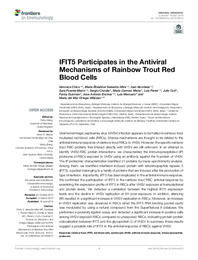Título :
IFIT5 Participates in the Antiviral Mechanisms of Rainbow Trout Red Blood Cells |
Autor :
CHICO GRAS, VERONICA 
Salvador Mira, Maria Elizabhet 
Nombela, Ivan 
Puente Marin, Sara 
Ciordia, Sergio 
Mena, María Carmen
Perez, Luis
coll, julio 
Guzman, Fanny 
Encinar, José Antonio
Mercado, Luis 
Ortega-Villaizan, Maria del Mar  |
Editor :
Frontiers Media |
Fecha de publicación:
2017-04 |
URI :
https://hdl.handle.net/11000/34453 |
Resumen :
Viral hemorrhagic septicemia virus (VHSV) infection appears to be halted in rainbow trout nucleated red blood cells (RBCs). Diverse mechanisms are thought to be related to the antiviral immune response of rainbow trout RBCs to VHSV. However, the specific rainbow trout RBC proteins that interact directly with VHSV are still unknown. In an attempt to identify VHSV-RBC protein interactions, we characterized the immunoprecipitated (IP) proteome of RBCs exposed to VHSV using an antibody against the N protein of VHSV. The IP proteomic characterization identified 31 proteins by mass spectrometry analysis. Among them, we identified interferon-induced protein with tetratricopeptide repeats 5 (IFIT5), a protein belonging to a family of proteins that are induced after the production of type I interferon. Importantly, IFIT5 has been implicated in the antiviral immune response. We confirmed the participation of IFIT5 in the rainbow trout RBC antiviral response by examining the expression profile of IFIT5 in RBCs after VHSV exposure at transcriptional and protein levels. We detected a correlation between the highest IFIT5 expression levels and the decline in VHSV replication at 6h post-exposure. In addition, silencing ifit5 resulted in a significant increase in VHSV replication in RBCs. Moreover, an increase in VHSV replication was observed in RBCs when the IFIT5 RNA-binding pocket cavity was modulated by using a natural compound from the SuperNatural II database. We performed a proximity ligation assay and detected a significant increase in positive cells among VHSV-exposed RBCs compared to unexposed RBCs, indicating protein-protein colocalization between IFIT5 and the glycoprotein G of VHSV. In summary, the
|
Palabras clave/Materias:
rainbowtrout
IFIT5
redbloodcells
erythrocyte
VHSV
antiviral immune response
immunoprecipitate
proteomic |
Área de conocimiento :
CDU: Ciencias aplicadas: Cuestiones generales de las ciencias aplicadas |
Tipo de documento :
info:eu-repo/semantics/article |
Derechos de acceso:
info:eu-repo/semantics/openAccess
Attribution-NonCommercial-NoDerivatives 4.0 Internacional |
DOI :
https://doi.org/10.3389/fimmu.2019.00613 |
Publicado en:
Frontiers in Immunology, April 2019 | Volume 10 |
Aparece en las colecciones:
Instituto de Investigación, Desarrollo e Innovación en Biotecnología Sanitaria de Elche
|
 La licencia se describe como: Atribución-NonComercial-NoDerivada 4.0 Internacional.
La licencia se describe como: Atribución-NonComercial-NoDerivada 4.0 Internacional.
.png)
